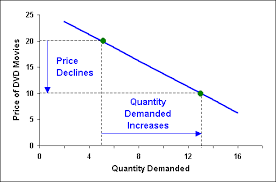This is the first economic question most students have to tackle- what is the law of demand? But before we address that question, we need to understand what demand is.
In economics, demand is not just the want for a particular item or a service, it is want for a particular item combined with a means to pay for it. For instance, if you want to buy a car, it will not be considered demand, if you don’t have the money for it. However, if you want to buy a car, and you have the money for it, or you can apply for a loan, it will be considered demand.
Now that we know what demand is, we can study the law of demand. Simply put, the law of demand states that ceteris paribus (all other things constant), the price and quantity of a demanded product or service is inversely related to each other. This means that when all other factors are kept constant, the price of a product will decrease as the demand rises, and increase as the demand falls.
So, essentially, things that are more expensive have less demand by virtue of them being that expensive. We would want to buy 6 or 7 beers because they are rather cheap- so the demand is high. But since diamonds are expensive, we would either not want to buy a diamond, or we would just buy one- which is why the demand is low.
